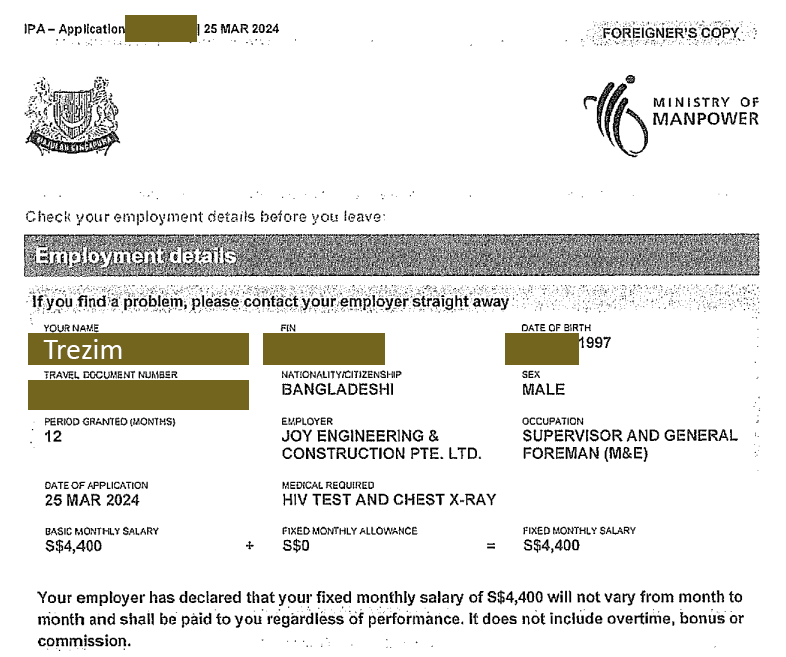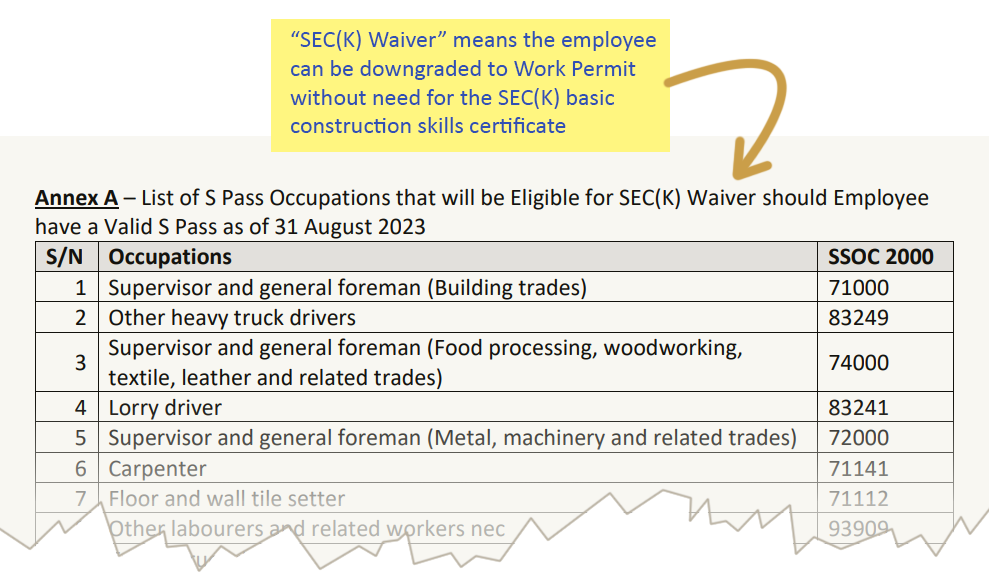
TWC2’s case officer (left) explains the salary claim process to one of the seven workers (right).
Seven construction workers with no trade skills or experience were hired on S-Passes, which are meant for workers whose skills justify midlevel salaries. How did that happen?
In Part 1, we wrote about seven construction workers who had been hired at various times in 2024 on S-Passes. It struck us as very unusual since none of them had technical trade qualifications. None even had the basic construction skills certificate normally required before any foreigner can take on a rookie construction job. Yet, all were offered monthly salaries of $4,000 or higher, eight times what a typical migrant worker with no qualification or experience would get in this industry sector.
All seven workers were hired in 2024, between March and October. They were split between two related companies with similar names. Three men were with Joy Engineering and Construction Pte Ltd, the other four were employed by Joy Construction and Engineering Pte Ltd.
To get the back story, we speak at some length with the spokesman of the group, whom we will call Trezim. He tells us that the two companies – both in the fire sprinkler business – are owned by a husband-and-wife team, both Bangladeshis. The wife is also a Singapore permanent resident, he adds. One spouse is a director of one company, the other the director of the other company, though we neglect to ask Trezim which was which.
According to Trezim, the husband’s name is Mustafizur Rahman (our spelling may not be accurate), but he does not know the name of the wife. However, a look at the published profile of Joy Engineering and Construction reveals a name MST Razia Sultana, and she has Bangladeshi nationality, a Singapore address and an identity number that indicates permanent residency. She is the sole director of the company. The details are consistent with Trezim’s information.
Since a woman’s name was on the business profile of Joy Engineering and Construction, we expected to see Mustafizuh’s name on the business profile of Joy Construction and Engineering. However, by the time we extracted the information from official sources, the company had come under compulsory liquidation, and there was a liquidator’s name instead.
Recruitment in Bangladesh
Trezim explained that Mustafizur’s extended family was involved in the recruitment of workers. Based in the Bogura District of Bangladesh (sometimes spelled Bogra), about 150km northwest of the capital Dhaka, the family were the local bigwigs. When Trezim began looking for work in Singapore, several people told him that the Mustafizur family should be who he should contact.
Trezim himself is from Bogura District, as are most of the other members of the group. Only one worker among the seven is from a different (but adjacent) district.
The Mustafizur family asked for ten lakh as the price for a job, says Trezim. At the exchange rate prevailing in early 2024, it would be about $9,000. The other six workers paid the same amount, Trezim says, because they naturally compared notes once they got to know each other. This fee had to be paid in full before they could come to Singapore.
Unfortunately, nothing in that back story explains why Mustafizur and wife chose to hire them on S-Passes, rather than choose workers with basic skill certificates who would qualify for Work Permits. In 2024, the minimum salary to qualify for an S-Pass was $3,150, whereas for Work Permit holders, there is no minimum salary. Perhaps the business was booming and the employers could afford to pay these salaries or there was a larger scheme afoot.
It is also possible that the family wanted nothing to do with the skill training centres in Bangladesh. If they had wanted to hire basic-skill certified workers, these would have to come through the training centres, who would naturally demand a big cut of whatever recruitment fee the workers paid. Perhaps the family wanted to keep all $9,000 for themselves.
The downgrades to Work Permits
As described in Part 1, four of the seven workers were subsequently downgraded from S-Passes to Work Permits, with salaries cut by 85% or more.
If the scheme had all along been to downgrade the workers from S-Pass to Work Permits, it certainly took a while – we don’t know why. Somewhat to our surprise, the men reported actually being paid their S-Pass salaries for their first few months at work.
However, we think the employers knew about a loophole that the Ministry of Manpower (MOM) created through a circular published in August 2023, and were intending to exploit it, but somehow the plan didn’t work out as quickly as intended. Possibly, they needed permission from MOM to effectuate the downgrade, and that took longer than expected. For more information about that circular, see the footnote.
Why do we suspect that the scheme was afoot from the very beginning? Because there was something unusual again about the In-Principle Approval (IPA) that Trezim had in hand. IPAs are issued by the Ministry of Manpower to signal their approval of a work pass (in this case, of the S-Pass category) for a foreigner. The details on the IPA, such as occupation and salary, are submitted by the employer (or their authorised, Singapore-licensed agent), not by the worker.
Unlike most IPAs we see which contain short descriptions under Occupation, e.g. “Supervisor”, “Restaurant Manager” or “Diver”, Trezim’s IPA states his occupation as “Supervisor and general foreman (M&E)” which is not only unusally wordy by also aligns with the August 2023 circular put out by the Ministry of Manpower (see footnote), whose appendix lists occupations that can be downgraded from S-Pass to Work Permits. Right at the top of the list of downgradeable occupations is “Supervisor and general foreman (Building trades)”, virtually the same phrasing as Trezim’s IPAs. Are we to believe this was pure coincidence?
Below is Trezim’s IPA:

The extract below is from the August 2023 circular listing the occupations of S-Pass holders who can be downgraded to Work Permits without need for basic construction skills certificates:

Overtaken by events
By the end of 2024, even before the first worker was downgraded, the business was evidently in trouble. The wiley plans were being overtaken by events. January 2025 was the last month that the seven men received their salaries; after that no more except for a few hundred dollars to buy food. If the husband-and-wife team had some grand plan to downgrade the workers to Work Permits and reduce their payroll cost, it all seemed moot by then when they couldn’t even pay the lower Work Permit rates.
The workers walked off their jobs at the end of May 2025. Two months later, Joy Construction and Engineering was put under compulsory liquidation. The whole affair has the air of greed reaping its just rewards.
And seven workers, after sinking in $9,000 each, now have to look for new jobs.

The official loophole
On 15 August 2023, the Ministry of Manpower (MOM) and the Building and Construction Authority (BCA) issued a Circular on Updates to Construction Work Permit Holder (WPH) Policies in which paragraphs 7, 8 and 9 set out new policies regarding the downgrading of S-Pass construction workers to Work Permits.
It explains that whereas under previous rules, all Work Permit holders in the construction sector must have the SEC(K) basic skills certificate, and this includes S-Pass construction workers who are downgraded to Work Permits, there is now a tweak.
Starting from 1 November 2023, an S-Pass worker who does not hold a basic skills certificate can still be downgraded to Work Permit provided he is paid at least $1,600 per month. Such a worker would (even in the absence of a basic certificate) be considered a skilled worker (R1 grade). This is “in recognition that S Pass holders possess a higher skillset”, the circular explains.
It should be noted that this does not mean that all S-Pass holders downgraded to Work Permit must be paid $1,600. They can be downgraded to salaries lower than that, provided that they have the basic skills certificate.
The significance of the $1,600 salary level is this: Above that, the worker is considered an R1 higher-skilled worker and the monthly foreign worker levy is (currently) $500 a month. Below that salary level, the worker is considered an R2 basic-skilled worker and the monthly foreign worker levy is (currently) $900 a month. Here, we are referring to workers from India, Myanmar and Bangladesh – source countries for the vast majority of construction workers in Singapore.
For S-Pass employees, the levy rate was revised to $650 a month starting from 1 September 2025.
Annex A to the circular provides a “List of S Pass Occupations that will be Eligible for SEC(K) Waiver should Employee have a Valid S Pass as of 31 August 2023”. At the very top of this list is the occupation “Supervisor and general foreman (Building trades)”. Any S-Pass holder with this occupation can be downgraded to R1 Work Permits without needing to hold a basic skills certificate.
However, the circular also has several paragraphs (all quite confusing) that suggests that waiver of SEC(K) requirements for downgrades to Work Permits is not automatic, and that permission from MOM is still needed, but we’re not sure if our interpretation is correct.
16411, 16414, 16416, 16412, 16415, 16410, 16418
